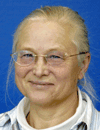
Thursday, 2 February 2012 |
Isolation and Analysis of CTCs: Emerging Technologies Impacting the Field |
| | 09:00 |  | Keynote Presentation Geometrically Enhanced Differential Immunocapture for Capture and Analysis of Circulating Tumor Cells
Brian Kirby, Associate Professor, Cornell University, United States of America
This presentation will detail capture of CTCs with GEDI microdevices, and describe their implementation in castrate-resistant prostate cancer and other diseases. |
| 09:30 | Fluid Phase Biopsy of Solid Tumors
Peter Kuhn, Professor, Scripps Research Institute, United States of America
The fluid phase of solid tumors is an emerging research area that holds the promise of both deep basic science cancer discoveries and direct applications in personalized cancer care. Utilizing the HD-CTC assay we are undertaking a series of clinical studies investigating the metastatic pathways in cancer patients. | 10:30 | Coffee Break and Networking in the Exhibition Hall | 11:15 | Liquid Biopsy of Ovarian Cancer: Issuing Diagnosis and Planning Therapies of Ovarian Cancers Based Upon Genome Sequencing and Gene Expression Profiling of Single Cells From Peritoneal Fluid and Blood.
Marek Malecki, President, Phoenix Biomolecular Engineering Foundation, United States of America
| 11:45 | Nanobiotechnology for the Capture and Manipulation of Circulating Tumor Cells
Michael King, Associate Professor, Cornell University, United States of America
Thin coatings of naturally-forming halloysite nanotubes can greatly improve the efficiency of CTC capture from blood samples under flow. In related work, we have developed novel procedures for the delivery of siRNA, taxanes, and receptor- mediated apoptosis signal to CTC. | 12:15 | Lunch and Networking in the Exhibition Hall | 13:30 | Poster Session | 14:15 |  | Keynote Presentation Circulating Tumor Cells and Disseminating Tumor Cells for Guiding Cancer Therapy
Stefanie Jeffrey, Chief, Stanford University School of Medicine, United States of America
The roles of CTCs and DTCs in the therapeutic management of solid tumors will be discussed, covering analytic methods and personalized models for drug testing. |
| 14:45 | A Microfluidic System (C5) for the Selection of Circulating Tumor Cells that Utilizes both Affinity and Size Capture Technologies.
Denis Smirnov, Associate Director, On Q Ity, United States of America
Detection of rare circulating tumor cells (CTC) from blood promises to be valuable for cancer diagnosis, prognosis, and treatment, provided that CTCs are found in a high percentage of late-stage cancer patients. Current techniques, based on antibody affinity capture, are compromised by low efficiencies, presumably due to lack of cell surface antigen expression required for capture. We will describe a novel CTC platform combining affinity capture with size filtration capture (C5 CTC chip). Utility of this system for enumeration and characterization of circulating cells will also be described. | 15:15 | Coffee Break and Networking in the Exhibition Hall | 16:00 | New Strategies for Analysis of CTC-Based Pharmacodynamic Biomarkers in Clinical Development of Targeted Anti-Cancer Therapeutics
Lihua Wang, Senior Scientist, Frederick National Laboratory for Cancer Research, United States of America
The presentation describes development and validation of assay strategies for assessment of pharmacodynamic biomarkers in circulating tumor cells in clinical development of targeted anti-cancer therapeutics. | 16:30 | Microchip-based Immunomagnetic Detection of Circulating Tumor Cell
John Zhang, Associate Professor, The University Of Texas at Austin, United States of America
We describe a new method of microchip-based immunomagnetic CTC detection, in which the benefits of both immunomagnetic assay and the microfluidic device are combined. | 17:00 | CTC Interaction With the Extracellular Environment to Promote Metastasis
Gavin Robertson, Professor, Penn State Melanoma Center, United States of America
The biology of the CTC and its interaction with the extracellular environment are important determinants of whether it will lead to metastasis development. This presentation will discuss these issues and the therapeutic potential of disrupting this process to limit CTCs from developing into metastases. | 17:30 | Drinks Reception |
Friday, 3 February 2012 |
Significance of CTCs in Various Types of Cancer: Liquid Tumors vs. Solid Tumors |
| | 08:30 |  | Keynote Presentation Circulating Epithelial Tumor Cells (CETC): Detection and Individual Isolation for Molecular Profiling With Respect to EMT and Stem Cell Gene Expression
Katharina Pachmann, Professor, University of Jena, Germany
Monitoring CETC provides the earliest and most reliable indicator of successful treatment. It also, for the first time, allows molecular characterisation of individual circulating tumor cells and help to reveal mechanisms involved in relapse. |
| 09:00 | Combating Breast Cancer Brain Metastasis: The CTC Signature
Dario Marchetti, Endowed Professor, Baylor College of Medicine, United States of America
Correlating CTC profiling with breast cancer brain metastasis will be the topic of this presentation. We evaluated CTC heterogeneity and characteristics in patients possessing breast cancer brain metastasis by combining multiple CTC platforms and technologies. We provide first-time evidence for the selection of CTC subsets and their characterization by in vitro culturing. We identified candidate genes predictive of breast cancer brain metastasis by interrogating CTC subsets’ metastatic competency in xenotransplantation studies. | 09:30 | Significance and Characterization of Circulating Tumor Cells in Breast Cancer
Minetta Liu, Associate Professor and Chair, Oncology Research, Mayo Clinic, United States of America
The enumeration of circulating tumor cells (CTCs) is used to optimize treatment for patients with metastatic breast cancer. Prospective clinical trials demonstrate clinical utility when CTC enumeration is performed in conjunction with radiographic imaging and clinical evaluations. Refinements of existing technologies - or the development of improved technologies - are needed in order to increase the detection threshold of CTCs and to allow for further phenotypic and genotypic characterization of the collected cells. These advances may translate into use of CTC analysis in earlier stages of breast cancer for diagnosis and/or more effective clinical management. | 10:00 | Expanding the Definition of Traditional Circulating Tumor Cells (CTCs): Cells Associated With Cancer in the Blood of Patients With Solid Tumors
Jeffrey Chalmers, Professor, Ohio State University, United States of America
The currently accepted definition of CTCs are cells that have: a nuclei, cytokeratin+ EpCAM+, and CD45-. Emerging evidence suggests that other rare, cancer associated circulating cells are present in the blood of metastatic cancer patients including CD45+ cytokeratin+ cells. A negative depletion process to isolate and quantify circulating tumor cells from the blood of head and neck cancer patients, using immunomagnetic separation was developed and is currently being validated on a number of solid tumors, including SCCHN and Breast Cancer. Correlation of number of CTCs, (tradition definition) tumor site, tumor stage, nodal status, smoking/alcohol abuse, histopathological characteristics, and clinical outcome was made with the SCCHN patients. In addition, the isolation of these cells is being used to measure the effectiveness of experimental drug combinations in a NCI approved study. | 10:30 | Coffee Break and Networking in the Exhibition Hall | |
The Use of Circulating Tumor Cells in Clinical Development |
| | 11:15 | Answering a Question With a Question: Circulating Tumor Cells From a Surgeon's Perspective
Daniel Boffa, Assistant Professor, Yale School of Medicine, United States of America
| 11:45 | Enrichment of Melanoma Circulating Tumor Cells (CTCs) From Blood Using Negative Selection by an Automated Magnetic Sorter
Powrnima Joshi, Research Fellow, Lerner Research Institute/Cleveland Clinic Foundation, United States of America
Melanoma CTCs have proven difficult to identify and enumerate. We show here that using a magnetic leukocyte depletion strategy combined with immunocytochemistry against melanoma specific markers (S100 and melan-A) we can identify CTCs in stage IV patients. | 12:15 | Lunch and Networking in the Exhibition Hall | 13:30 | Poster Session | |
CTCs as Prognostic or Predictive Biomarkers for Cancer |
| | 14:15 | Circulating Tumor Cells: Challenges & Perspectives
Catherine Alix-Panabieres, Associate Professor, University Medical Center of Montpellier, France
The utility of circulating tumor cells will be discussed in the context of stratification and monitoring of cancer therapies and as “liquid biopsy” for identifying molecular targets and resistance mechanisms of new targeted therapy (companion diagnostics). | 14:45 | Monitoring DTCs and CTCs in the Adjuvant Setting of Breast Cancer
Wolfgang Janni, Head, University of Dusseldorf, Germany
A pooled analysis demonstrated that DTC detected in BM of breast cancer patients during relapse-free follow-up, is an independent prognostic factor for future relapse and cancer-related death. A large phase III trial von CTC in the primary setting was the first study to prospectively demonstrate the prognostic relevance of CTC in peripheral blood of early breast cancer patients before the start of systemic treatment in a large patient cohort. CTC detection could serve as clinically useful prognostic marker and treatment monitoring tool and should be tested as indicator for secondary adjuvant treatment interventions within clinical trials. | 15:15 | Coffee Break and Networking in the Exhibition Hall | 15:45 | Epithelial-to-Mesenchymal Transition in peripheral blood of Metastatic Breast Cancer Patients without CTCs
James Reuben, Professor, The University of Texas MD Anderson Cancer Center, United States of America
We showed for the first time that among all CTCs from peripheral blood of MBC patients we could isolate, independently of the EpCAM enrichment, a cluster of EMT-CTCs. | 16:15 | Toxicological investigations on Cultivated Circulating Tumour Cells (CTCs) to monitor anticancer treatment improving patient management
Natalia Malara, , University of Catanzaro, Italy
CTCs isolation and their propagation in cell culture exploit the proliferative advantage of cancer cells respect to healthy hematological cells that do not survive long in vitro. CTCs became viable to phenotypic and proliferating characterization.
| 16:45 | Close of Conference |
|

 Add to Calendar ▼2012-02-02 00:00:002012-02-03 00:00:00Europe/LondonCirculating Tumor CellsCirculating Tumor Cells in San Diego, USASan Diego, USASELECTBIOenquiries@selectbiosciences.com
Add to Calendar ▼2012-02-02 00:00:002012-02-03 00:00:00Europe/LondonCirculating Tumor CellsCirculating Tumor Cells in San Diego, USASan Diego, USASELECTBIOenquiries@selectbiosciences.com